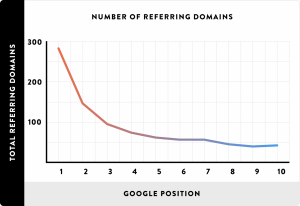- Domain authority refers to the hypothetical authority you have in the organic search landscape based on the number of external links pointing to your site.
- If your domain name is new and holds no authority, it may take a lot of work to build up your authority.
- Fortunately, you can still build links to your site without any domain authority.
- Links can be built via local press, by leveraging your expertise, by participating in interviews, and by creating great content for your own site and others.
We get it; you’re a small business owner or startup founder just learning about the world of digital marketing. You’re reading articles about on-page SEO, content marketing, and link building and probably asking yourself, “How the heck am I going to do all this work on my own?!” And you’re absolutely right! It is a lot of work to tackle alone.
Search engine optimization campaigns, let alone link-building for new websites or startups, can be a team’s worth of work. And if your domain name is new and holds no authority, you’re going to have to do a lot of work to build up your authority, especially if you believe in the concept of the “Google Sandbox.”
But there is hope! The link building experts at Redefine are here to maximize your efficiency. In this article, we’re sharing our tips on low-cost, low-effort methods for building links for your new website, start-up, or small business. We know you’re busy and probably wearing multiple hats daily, so don’t let link building be the one that breaks your neck! Without further ado, let’s dive into the easiest ways to get started with link building!
Domain authority, what’s the deal?!
Before we give you our recommendations, let’s talk about domain authority and why it’s important.
Domain authority, which is also known as Authority Score or Link Equity, refers to the hypothetical authority you have in the organic search landscape based on the number of links pointing to your site.
Authority metrics are based on a scale of 0 to 100 and give SEOs an idea of the SEO value that a site might have. We go into more detail on domain authority here. Essentially, the higher your domain authority, the more likely you are to rank in search results for the topic you write about.
While the score itself has absolutely nothing to do with how Google perceives your site, it does help you directionally. Domain authority is important because it gives you an idea of the overall growth of your website and backlink profile. Theoretically, if you scale your website all the way up to 100, Google trusts your content and will be generous with its rankings.
Is it possible to build authority without links?

Graph of referring domains vs. Google position, from Backlinko.
If this is already starting to sound like a lot of work, then you’re probably wondering, “Is it possible to build authority and rankings without links?” It’s a valid question to ask when considering link building for your new site.
So we’ll answer this honestly: building authority without links is a pretty difficult task, and without them, you may not be able to rank for some of the high-value keywords you’d like to rank for.
Think of links as votes in a popularity contest. The more votes you have, the more popular you are. To Google, a website without any links isn’t likely to be popular among consumers or other Google searchers, so they probably won’t rank it for anything other than its brand name.
Although we underscore the importance of backlinks, we’ll be completely transparent: having tons of links doesn’t guarantee you rankings, either. Those links need to be accompanied by great content. If you are going to start link building for your startup, you should start by developing some high-quality content.
Ways to build links without any authority
Generate local press (community service events, tradeshows, etc.)
If you’re a startup or small business with no domain authority, the best place to start generating links is by participating in your local community. In our opinion, this is the easiest way to build links because all you have to do is participate! Here are a few ideas:
- Host a networking event and invite local press to promote it on their news sites.
- Sponsor a tradeshow/corporate event: Most tradeshows have websites where they link out to vendors to let attendees know what vendors will be there.
- Participate in a charitable event or community service.
Develop linkable assets
Linkable assets, or link building assets, are an industry term for content that people organically want to link to.
Common examples of linkable assets include well-written blogs, groundbreaking research, surveys, or case studies. It could even include helpful tools like free software, or virtual calculators that might save a person time with a simple task.
One of our favorite linkable assets to reference is this A/B Testing Calculator by Neil Patel. It’s such a simple tool that is obviously made for small businesses or new marketers, and it’s generated over 700 backlinks for Neil’s website.
Or here’s a more traditional example, Search Engine Journal’s “History of Google Algorithm Updates” article. According to Semrush, this article has over 26,000 backlinks and nearly 3,500 referring domains! With a staple piece of content like this, it’s easy for writers to not even think twice about linking to it when they write an article that references a past Google update.
So get creative and see what kind of linkable assets you can build for your new website!
Directory submissions
When you are trying to build links for new websites, submitting your website or startup to a directory could be a fast, low-effort method for building links. But it’s important to note that nothing that’s easy is usually worthwhile. However, while Google has devalued directory links over the years, there is still some benefit to getting them.
Our recommendation is to be a bit more mindful of what directories you submit your site to. If possible, make sure they are relevant to your industry, have some history, and confirm that being listed on these directories can generate some leads.
Get more position 1 rankings
One of the most impactful ways to build links for your startup’s website is to get your first Position 1, featured snippet, or AI Overview ranking in Google Search. This might sound counterintuitive to what we’ve been preaching – because we’ve been saying you need links to rank – but let’s think about this.
If you are in the first position, or hold a featured snippet or AI Overview ranking, you’ll be the first page a Google searcher will see when they are doing research on a topic. This makes you much more likely to be the first article they link to when they write their own article. S, the more of these rankings you can secure, the better you position yourself to gain relevant links with the least amount of effort.
Engage on Reddit, Quora, or forums
Another relatively simple way to build links for your website is to engage on forums, subreddits, or Quora.
Reddit is a community-based social media platform that’s focused on single topics or themes. Quora is a similar forum, but it’s based around a question-and-answer format. You can find a community for nearly anything on Reddit and Quora!
For link building, Reddit is a great place to engage in conversation with like-minded individuals in your industry or niche. Redditors may post questions or share stories, which makes it the perfect place to provide your unique perspective and links.
By engaging in conversations, you can include links to articles on your website within your comments or posts, immediately creating a backlink. Google will view these user-generated links differently from organic links on blogs or other websites, but these types of links are great for driving targeted referral traffic.
It’s also said that the Google bot will find the content faster if it’s linked on popular subreddits or Quora answers, so a good tactic may be to prioritize recent articles or pages. AI search engines like ChatGPT, Perplexity, and Claude will also draw a lot from Reddit or Quora, so this particular tactic could amplify your efforts across emerging channels. The most important thing to remember is that even if you aren’t linking back to content, simply mentioning your brand could have equal benefit, assuming AI engines pick it up.
Leverage your personal expertise
Since you are just starting and might not have a ton of content on your site, the best way to get links is to leverage your own industry expertise! Reporters all over the world are constantly looking for experts to provide insight on a specific topic. Historically, the go-to platform to respond to reporters was HARO.
HARO, also known as Help-A-Reporter-Out, is a 3x daily newsletter where journalists pose questions about topics for articles they are writing. The mutual understanding on source-to-journalist platforms is that if a journalist accepts your pitch, then they are supposed to include you in their article and link to your website.
In 2023, HARO was rebranded as Connectively – and by the end of 2024, the platform was shut down. However, in April 2025, HARO was resurrected by Featured.com, a similar platform that provides journalists and sources a place to exchange information. Featured.com announced they also acquired Connectively, which was discontinued in 2024, but it’s not clear how HARO and Connectively will coexist.
The concept of pitching/responding to journalists is alive and thriving! Here is a list of some alternatives where you can increase your chances of gaining free press:
Continue to write great content
It’s that simple. When you dedicate as much time as you can towards your blog and stay consistent, the backlinks are just going to roll in.
Why is content such a strong strategy for link building? It’s because Google rewards great content with rankings. So the more high-quality content you produce, the more organic rankings you’ll get. And as soon as other writers get wind of your great content, they’re going to link back to it without question.
Your efforts shouldn’t stop here, though. Always amplify your content on social media by sharing the link or creating a fun graphic or video around it!
Build up your social media presence
Building links for your new site isn’t just about doing outreach, getting listed on directories, or writing great content. There’s a lot more to it! In fact, one of the best ways to build links is by posting on social media.
Link building, at a very basic level, is all about increasing the visibility of your content to earn backlinks. The more eyes you can get on your content, the more likely you are to gain links to that content. By focusing your time on building your social media presence, you are able to increase visibility around your brand and content, thus boosting your chances of getting links.
Write content for others
Say hiring a fancy PR agency is out of the question, or consistently writing great content is too difficult. Then your next best option is to write content for others and propose that they allow you to link back to your website or promote your product in some fashion. In the SEO world, this is referred to as guest posting or guest contributing.
Guest posting is a great way to boost your brand awareness and thought leadership while building links for your website. To do this, simply contact each and every blog in your industry, locate the contact information of editors or writers, and then pitch them a great topic!
Participate in interviews
Finally, participating in interviews is another great way to leverage your expertise to build up your domain authority. To do this, simply scour the web for interviews with other industry experts, then just contact those writers or editors. You’ll obviously want to pitch them an interview idea and share what value you can bring to them and their readers.
Or maybe while you are doing your work on those source-to-journalist platforms, you build a network of journalists whom you can easily tap into when your brand has news to share! Either way, interviews are an excellent way to boost your brand’s credibility.
Unlinked brand mentions
Oftentimes, on the web, pages might get published that mention your brand name but aren’t linking back to your website.
For example, a content writer might create a blog called Top 10 Coffee Shops in Covina, list all 10, include images of your coffee shop, and include a brief description – but not link out to your website. These are what we refer to as “unlinked brand mentions.” They are mentions of your brands without links to your homepage.
The most effective way to reclaim these links is to reach out to the publisher directly with a link to the page and details about where your brand is mentioned. Kindly ask them to link back to your homepage. From our experience, this outreach strategy usually has a pretty high success rate and generally does not cost anything but your time.
Use AI automation to assist!
Recently, artificial intelligence has improved and unlocked new capabilities for digital marketing and broader business categories. AI Agents, for example, have been all the buzz lately as they can contextualize inputs from other software and execute tasks based on that input. Many use cases include automated sales outreach, customer service, and email response.
The next most obvious use case is automated link building prospecting and outreach. Tools like Respona or Clay could be extremely useful tools for doing a lot of the heavy lifting of prospecting and outreach, which up until the past year or so, has been a tedious manual task.
For a startup, small business, or small in-house marketing team, tools like this can make a world of difference to your SEO strategy and save you money and time from having to hire and train an entry-level SEO.
Bonus tip: Tap the experts!
Link building is a lot of work, but thankfully, we’ve given you an arsenal of tactics to use if you don’t have any domain authority. The great thing about these tactics is that some require less effort than others, so depending on your bandwidth, there is something in here for everyone!
If this still sounds like too much work, don’t hesitate to reach out to the link-building team here at Redefine! We love building links and we’re standing by to help.




